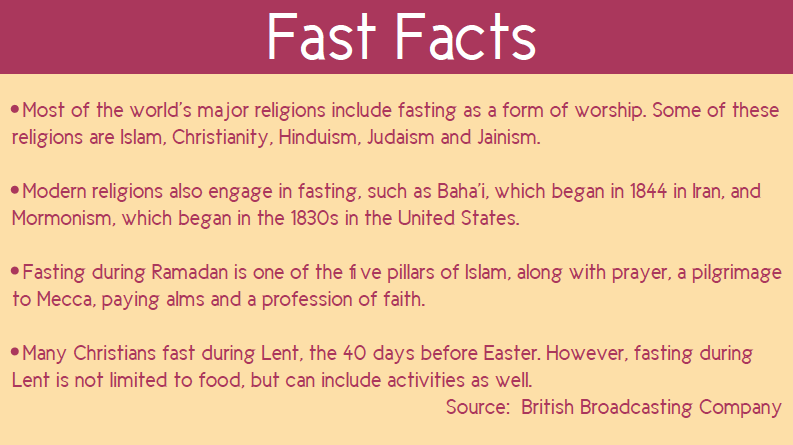
By Stori Long
Reporter
In the Gospel of Luke, Jesus retreated into the wilderness in order to fast for 40 days. For Muslims, fasting is one of five pillars serving as a foundation of their faith.
Ghandi even employed fasting as a means to protest British dominance in India. Faiths all over the world have a rich history and tradition with fasting as a form of spiritual discipline or using it for means of prayer and worship.
The practice of willingly depriving oneself of food is by no means an ancient or dead tradition, but remains an important part of faith of many individuals, including students on Baylor’s campus.
One of the primary goals of fasting is to demonstrate devotion and dedication to God by depicting how physical needs are less important than getting to know God better.
Charlottesville senior Chris Vanderpool and Pleasanton junior Elise Haykin participated in a fast with their church, Harris Creek Baptist Church, during the 40 days of Lent. At this time, they abstained from food after dinner on Sunday every week and fasted until the same time on Monday.
“Fasting goes right to the heart of the issue of Christianity. That we need to deny ourselves continually in order to grow closer to Christ and fasting is a very effectual way to do this,” Vanderpool said.
Kingwood senior Sandeep Roy, a Hindu, expressed a similar purpose for fasting— to move past the physical in order to grow closer to God.
“Fasting is a process in which mind, body and soul can be joined. … Fasting allows a person to put their mind and body in alignment with the purposes of the soul, which is to know God,” Roy said. “Essentially, fasting is a tool that individuals use to suppress the physical desires that impede knowledge of spiritual truth.”
Fasting also serves to help the participant to re-evaluate the purposes of food.
“Food is a gift from God and it is meant to sustain us,” Haykin said. “I can take it and turn it and make it sinful, like turning to food for comfort instead of turning to God. Food is meant to sustain us and help us to do his work better.”
Similarly, in Hinduism, fasting displays the same desire to make physical needs secondary to dedication to God, Roy said.
“It displays a devotion to God that surpasses the needs of the material plane,” Roy said. “It trains the body to accommodate spiritual demands and allows one to step away from the impurities of the physical plane and invest in the merits of spiritual cleansing.”
Haykin said fasting also serves to remind those who participate of their own humanity and need for God.
“You really get a sense of your own weakness,” Vanderpool said. “It provides God with a chance to speak to us.”
Haykin said this is one of the greatest benefits of going through the fast.
“It really make me more dependent on God and makes me cling to him, especially when I feel a pang of hunger,” Haykin said. “It makes me rely on God more.”
Despite the seemingly paradoxical discipline of depriving oneself of something necessary for surviving, many people in all kinds of faiths derive great benefits from the practice of fasting from food.
“I have fasted from things like music or certain shows before,” Haykin said. “But I think the whole thing about fasting from food is that it exposes our hunger and whenever we feel our emptiness we think it’s food, but a lot of time it’s God. This has helped me to turn my appetite to God and my hunger and thirst to him.”








